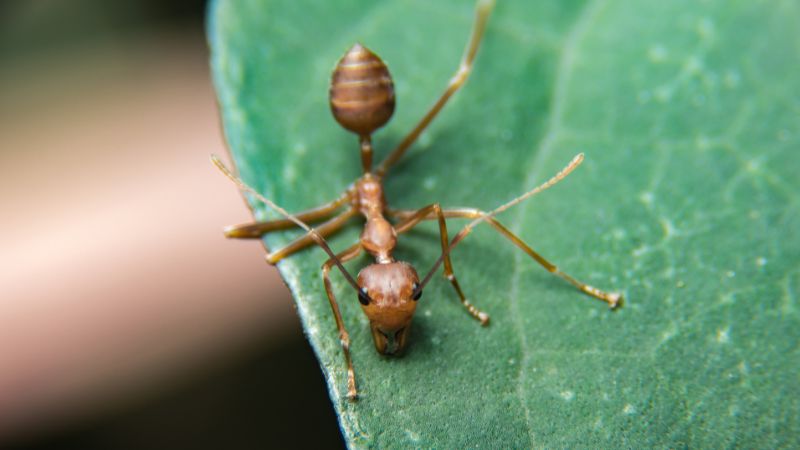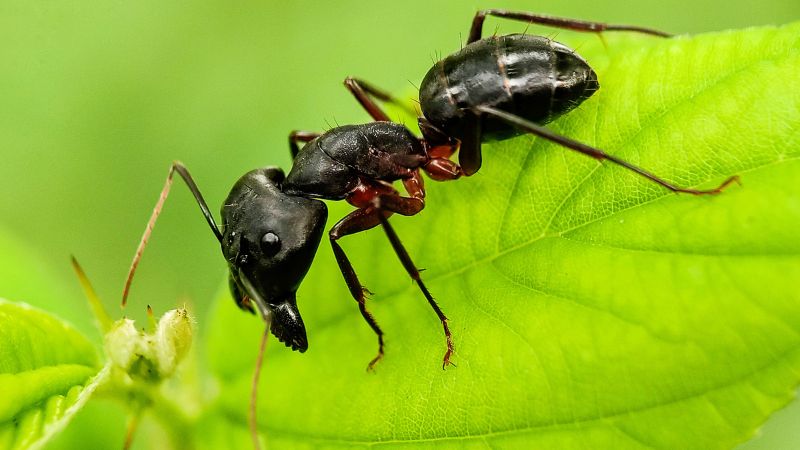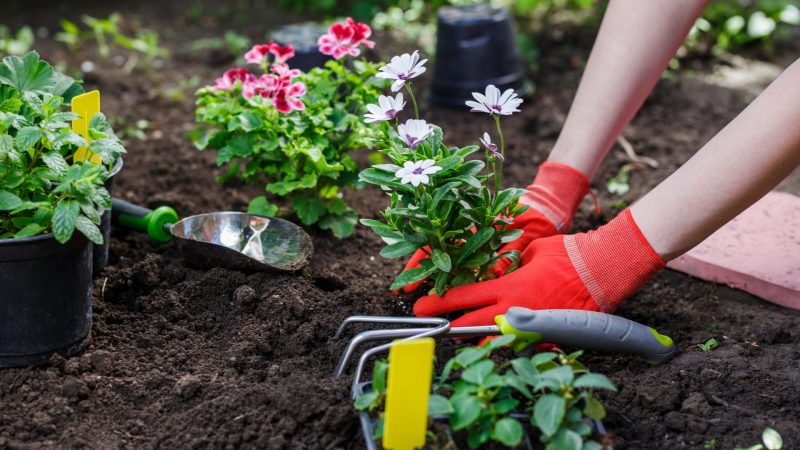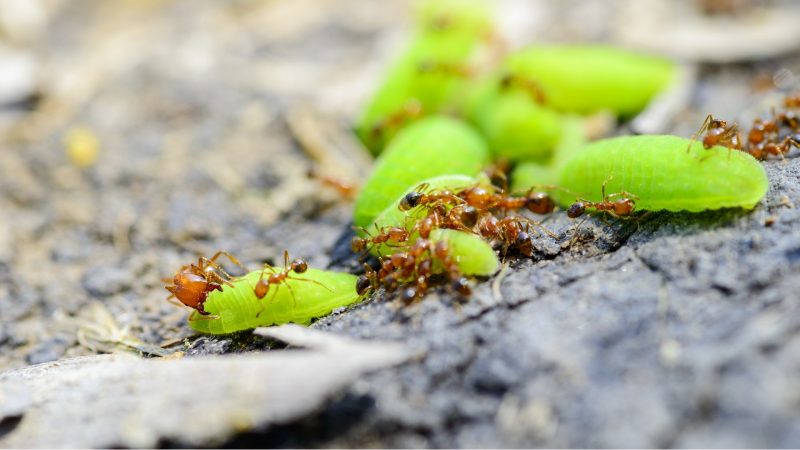While ants serve essential ecological roles in garden ecosystems, their anthills can become quite the unappealing sight if left undealt with. Moreover, some ants can actually cause harm to your plants.
So, how to get rid of ants in a garden? First, locate their nest, which is the source of the infestation. Then, use ant baits formulated with slow-acting insecticides, installing sticky barriers to your plants, or pour hot water directly into an anthill to destroy the colony.
Now let’s see why ants are bad for plants in your garden, and in later sections, we will dive a bit deeper into the positive impact ants have on your garden. Let’s start!
What Ants Are Bad for Plants in Your Garden?
In most cases, ants are good for your garden as they serve a variety of important ecological roles. However, certain species can cause inconveniences and even harm.

- Native fire ants can bite and sting, so you would certainly want to get rid of those if you want to have a fun and relaxing time in the garden why caring for your plants.
- Nonnative red imported fire ants can become an even bigger problem. At the moment, these insects don’t have any natural competitors anywhere except for South America. So, these annoying ants cause a significant decline in the native ant populations (the good guys) and also cause damage to plants.

- Even though carpenter ants will do minor damage (and in some cases, none) to your plants, these insects live in rotting wood and can become a real problem if your house is infested. This is why it is recommended to get rid of them.
Related: How Many Types of Ants Are There: Ant Identification Chart
Reasons Why Ants Are Good for Plants in Your Garden

Ants Aerate the Soil
Even though anthills might not look appealing, they are an indication of the fact that ants are aerating the soil. They turn over a lot of soil (in fact, as much as earthworms do) and that is incredibly beneficial for the soil and its fertility.
Ants also end up bringing a lot of small pebbles and various particles to the surface. Moreover, these tunnels also help more moisture get to the roots of the plants, which is a great bonus.
Ants Will Help You Fertilize the Soil
Ants like to collect things like dead insects and different leaves. All these things are usually brought into the nest, where they start decaying, making an excellent fertilizer for your soil. At the same time, all ants feed on different types of waste, acting as decomposers.
Ants Act as Seed Dispensers
The insects collect a wide range of seeds and take them to their nests. Usually, many seeds have a ‘fat layer’ around them. Ants eat the layer and then get rid of the actual seed. In such a way, the seed is ‘planted’ in nutrient-rich soil and gets saved from various predators.
Ants are ‘gardeners’ that especially love most violets, trout lilies, bleeding hearts, and a lot of woodland spring wildflowers. Plenty of flowers have adjusted the timing of fruiting and flowering to take advantage of the high ant activity (and that time is early in the year).
The Ants Protect Your Garden From Herbivores
Ants like the nectar they can find on plant stems, however, they are not attracted to the nectar found in the actual flowers. This fact makes the ants unique plant protectors. The ants will ‘patrol’ the plants they like and disturb some herbivores along the way.
For example, ants may attack seed-eating insects or interrupt the egg-laying, feeding or molting of herbivores. At times, the ants can simply ‘push’ other insects off the plant.
Related: Flowers and Plants That Attract Ants | Beautiful But Beware!
Ants Can Help With Adding More Butterflies and Birds to Your Garden
Even though ants may attack other insects, some creatures might benefit from these ant habits. Some caterpillars produce a sweet substance (honeydew) to attract ants. In such cases, the ants can become caterpillar protectors.
They might ‘farm’ the caterpillar and carry it into the nest. As a result, the caterpillar can complete its development in peace while the ants get honeydew. The more caterpillars are saved, the more butterflies there will be in your garden.
Insects Are Part of Food Webs
As mentioned earlier, ants may feed on other insects that might attack your garden and lawn. However, ants are also food for other animals such as insects, birds, and mammals. That’s why they are an incredibly important part of various food webs.
Related: What Do Ants Eat? | Ant Feeding Habits
The Cons of Having Ants in Garden

Ants Can Give Shelter to Mealybugs and Aphids
We have already figured out that ants can sometimes ‘farm’ other insects to access honeydew. However, ants can also protect pests from predators. So you might end up with different unwanted insects in your garden.
You Might Not Like the Anthills
Anthills don’t cause any damage and are not bad for your garden, but let’s be honest, they don’t look aesthetically pleasing. Some anthills might even pop up between decorative pavers. Also, it will be bad if your unsuspecting pets or children play with these anthills.
A Very Large Ant Population Can Harm the Root Systems of Your Plants
No one would mind a few ants running around in their garden. But sometimes, the growth of the colony might get out of control. If too many ants exist, their tunnels might end up harming your plants’ root systems.
However, even in such a case, using a pesticide is not the best option, as you might also harm your beloved plants. Some gardeners recommend boiling or soapy water for anthills. This simple recipe will help you control the ant population.
Some Garden Ants Are Not Good at All
We have already mentioned that the majority of ants are practically harmless. However, certain types might cause problems. Like fire or carpenter ants, for example. So, figure out exactly what ants are running in your garden before deciding whether you want to get rid of them or simply leave them alone.
How to Get Rid of Ants in Garden?
There are different ways in which you can get rid of ants in your garden. These control methods can be chemical, mechanical, and sanitary.
Sticky Barrier
For example, one of the mechanical methods is to apply a very sticky barrier to a collar of fabric or heavy paper and wrap stems or tree trunks with it. If you leave a single access point, the ants will get stuck to it and die. Remember to always trim down the branches to leave them only that one access point.
Here are effective products you can try:
- Works for gypsy moths, cankerworms, weevils, ants, caterpillars,...
- Long-lasting and weatherproof
- Ready-to-use in several sizes
- Also available in an easy-to-use kit
- This sticky solution provides a protective barrier for trees
- SUPREME TREE COVERAGE: Catchmaster's Tree Shield Insect Barrier...
- DEFEND YOUR TREES: Protect your trees, shrubs, and ornamental...
- INSECT BARRIER: Use the tree shield to help monitor for pests in...
- SAFE FOR ALL ENVIRONMENTS: This tree protection wrap is safe for...
- INTELLIGENT PEST MANAGEMENT: At our core, we are dedicated pest...
- WEATHER PROTECTION: Help new trees overcome harsh weather...
- HEALTHIER TREES: When food is scarce, many animals turn to tree...
- PEST CONTROL: Wrapped trees are less likely to suffer damage to...
- ECO FRIENDLY: Dalen Tree Wrap is a non-toxic, chemical-free...
- SATISFACTION GUARANTEED: We only work with top-quality materials...
Ant Baits
You can always use ant baits with slow-acting insecticides. There are many effective products in the market and they will not directly harm desirable plants in the garden. Below are tried and tested brands you can use:
- Metal Ant Killer Bait: Attracts and kills many different species...
- Food Lure Ant Bait: The child-resistant metal bait stations use 4...
- How it Works: Worker ants carry and share the bait with the rest...
- Quick Results: Starts killing worker ants within 24 hours; you...
- Usage: Homeplus Ant Killer AB baits are great for getting rid of...
- Attracts & Kills – Kills common household ants including...
- Kills the Ants You See & the Ones You Don't – As worker ants...
- Works Fast – You should see a significant decrease in the...
- Ready to Use – Insert stakes and cut the tab, then watch it...
- For Outdoor Use – Place the bait stakes in outdoor areas where...
- Starts eliminating in 24 hours
- Kills the queen, kills the colony
- Replace every 30 days
- Uses 4 Food Sources to Kill Listed Ants
Natural Home Remedy: Hot Water
The most straightforward method to get rid of the ant hills is just pouring hot water directly into the anthill and you will effectively get rid of the colony. However, for larger ant populations, this may require more persistence.
Make sure to think twice before attempting to kill the insects, as you might as well get rid of the ‘good’ lads that contribute to the ecosystem in many ways. Additionally, wear protective outfit if you can to avoid getting bitten by them.
Related: How to Get Rid of Ants | Safe and Effective Methods
What Can the Sudden Appearance of Ants in Garden Indicate?

The sudden change can indicate that mealybugs, aphids, and other insects are attacking your plants. Have you spotted a line of ants running up and down the tree, for example? Because aphids and mealybugs produce honeydew, making them targets for the ants.
Once the ants stroke the aphids, they will excrete the honeydew. The ants will then swallow the substance and store it in their crop (a special place in their stomach). After that, the ants bring the honeydew back to the nest a feed the workers and the queen.
Like some types of caterpillars, ants can keep aphids in their nests and give them shelter in exchange for honeydew. In this case, you should worry more about mealybugs or aphids in your garden, not the ants.
List of Sources
Cremer, S., Ugelvig, L. V., Drijfhout, F. P., Schlick-Steiner, B. C., Steiner, F. M., Seifert, B., … Boomsma, J. J. (2008), The evolution of invasiveness in garden ants.
Farji-Brener A., & Werenkraut, V. (2017). The effects of ant nests on soil fertility and plant performance: a meta‐analysis.
Iowa State University. (n.d.). Ants Are Ecologically Beneficial
Ling, J. T. Y. (2018). Ants Can Feed Plants.
Williamson, J. (2021). Controlling Fire Ants in the Vegetable Garden, Clemson University
- How to Get Rid of Cockroaches? | Proven Strategies & Solutions! - June 24, 2023
- Powerful Homemade Wasp and Bee Sprays (with Recipes) - March 4, 2023
- Crazy Ants Invasion | Eradicate & Prevent Unwanted Guests - February 24, 2023







